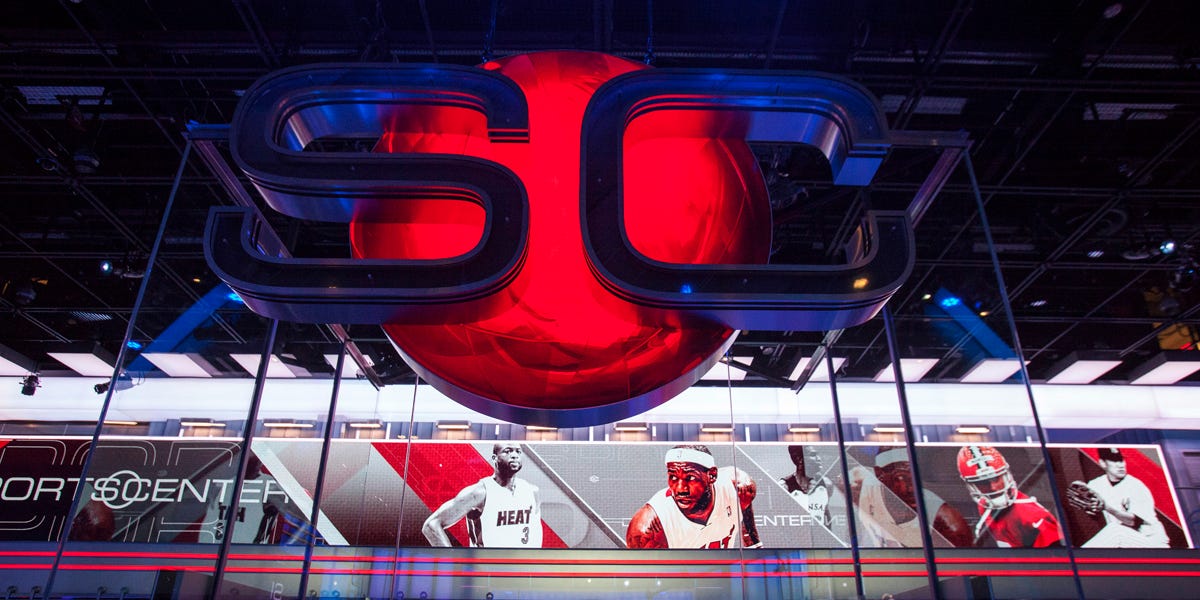- Industry insiders say ESPN’s deal with Penn Entertainment could signal a potential ESPN spinoff from Disney.
- Disney announced a $2 billion deal with casino operator Penn Entertainment to create ESPN Bet.
- Experts break down how the deal could bolster ESPN and what’s next.
ESPN’s $2 billion Penn Entertainment deal rocked the sports-betting world — and also renewed speculation among industry insiders that Disney could spin off its media crown jewel.
First, they point out, the revenue due to come from the deal could ease the financial pressure on ESPN as Disney, along with other media companies, scrambles to pay soaring sports rights costs as cable revenue declines.
The deal can help Disney in a couple of other ways. It supports its longer-term goal of selling more services directly to consumers as it moves away from its dependence on the declining cable model. It also could provide ESPN with a new source of customer data that could improve its advertising appeal.
Bottom line, making ESPN a stronger company could improve its attractiveness should Disney decide to sell it or seek investment partners.
Disney owns 80% of ESPN, while Hearst owns the other 20%.
Disney CEO Bob Iger has already said publicly the company is seeking partnerships or investors to help it cover the cost of its planned direct-to-consumer transition for ESPN (while emphasizing it wants to keep control ESPN). CNBC reported Disney has had early talks with the NFL, NBA, and MLB about becoming investors in ESPN.
“You want it to look attractive as a standalone,” said Jonathan Miller, chief executive of Integrated Media Co., which specializes in digital-media investments. “In order to do that, you have to be able to pay for sports rights.”
The Penn deal also creates a stronger cultural separation between ESPN and Disney’s family-friendly brand, which could help build the case for a spinoff, a sports investment exec said. Just four years ago, Bob Iger said he didn’t see Disney getting into betting. But, as the Supreme Court eased regulation on sports betting, more than half US states have since legalized some form of it.
“There was always this conversation at Disney, how close do they want to get to gaming — it puts them further on an island away from it,” the investment exec said.
One employee also said Disney had recently assigned dedicated tech-support staff to ESPN, musing this could make a separation easier to do from an operations standpoint.
ESPN wants to catch up in betting, in a play for young fans
Some company watchers think the Penn deal will help ESPN catch up in the growing sports-betting arena, especially with younger consumers. ESPN has had marketing deals in place for years with Caesars Entertainment and DraftKings, which paid ESPN to push its fans to those betting companies’ platforms. Those deals will now be winding down.
“For Penn, it was a good way to align the relationship that has good potential to grow their market share,” said longtime media banker and investor Alex Ilosevich of Alignment Growth. “Penn is struggling; ESPN could be helpful in gaining market share. For ESPN, it’s not as material, but it’s helpful — ESPN has locked in a 10-year partner with guaranteed pay so that improves the visibility of ESPN’s revenue. It’s also helpful with brand exposure.”
To be sure, some industry watchers have questioned how the deal positions ESPN’s ability to catch up in the sports-betting race. Notably, it didn’t wind up with one of the leading sports-betting players, DraftKings or FanDuel; industry insiders have speculated those operators may have insisted on having their name as part of the branding. In discussing the deal on an earnings call August 9, Iger said Penn’s offer was significantly better than those made by rivals.
Penn pledged to spend about $150 million a year on marketing on top of the $150 million annually it’s committed to ESPN; FanDuel or DraftKings on the other hand have been spending many times that — DraftKings spent nearly $600 million in the first half of 2023 alone and FanDuel’s parent spent over $530 million in the US.
Not only that, ESPN benefited from an estimated $200 million in annual marketing from long-standing marketing deals it’s had with Caesars Entertainment and DraftKings, which are coming to an end and could cut into ESPN’s revenue. The Penn pact doesn’t preclude ESPN from selling commercial time to rival sportsbooks, but it does come with some ad and sponsorship exclusivity.
The ESPN deal also didn’t mention a land-based casino element, which could limit the bad optics for family-friendly Disney, but also means it’s missing out a high-margin business, according to a gaming exec.
Buyers for ESPN could include private equity, Saudi entities
If ESPN’s long-term goal was to merge with bigger sportsbooks FanDuel or DraftKings, which many investors had hoped would come to pass, or for ESPN to build its own sportsbook after a Disney spinoff, being tied to Penn for the next decade could impair its ability to do so, LightShed Partners wrote in an August 9 note.
ESPN’s embrace of betting could also make it harder for it to attract sports leagues as investors, which have distanced themselves from gambling, although that distaste has waned as sports betting has soared. According to the American Gaming Association, sports betting grossed $7.5 billion in gaming revenue in 2022, up 75% from 2021.
If Disney were to put ESPN on the market, potential buyers could come from private equity, a category that’s become increasingly interested in sports. Strategic partners could also include Amazon, Comcast, sports-merch giant Fanatics, Peyton Manning’s Omaha Productions, or a Saudi Arabian entity, Front Office Sports reported in July based on conversations with sports-media advisors.
Ashley Rodriguez contributed to this story.
Read the full article here





